There’s no clear answer as to how many Elvis Presley movies there are. We know that he starred in 31 feature films, but some claim that he was actually in as many as 50 films. Unfortunately for “The King,” quite a few of those pictures were overly formulaic duds, so bizarre and cringeworthy that it’s a miracle his career survived the entire ordeal at all.
Ranging from mediocre to downright awful, each of these 15 Elvis Presley movies showcases just how much Hollywood exploited the legend’s popularity, making as much money as possible until, ironically, growing skittish once audience fatigue set in.
Perhaps the biggest lesson learned from Elvis’ career nosedive is that he could have been just fine with a few films, focusing more exclusively on his music and touring. Who knows how things could have been different had Colonel Tom Parker not committed his client to so many films for the sake of a hefty payday?
15. Charro!
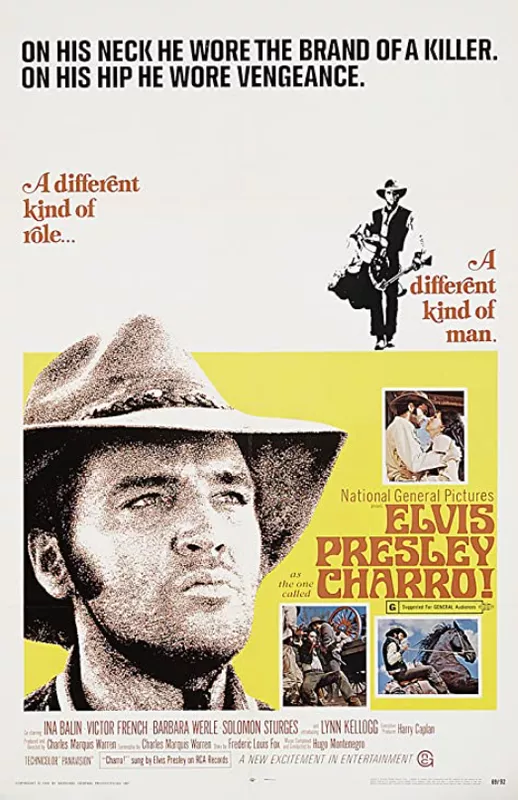
California Pictures / IMDb
Release date: 1969
Director: Charles Marquis Warren
IMDb score: 5.6/10
Box office earnings: $3.27 million
Charro!: The Bottom Line
Elvis landed the lead in “Charro!” after actor Clint Eastwood turned it down. In the movie, he plays Jess Wade, an ex-gang leader-turned-hero who faces off with his former criminal cohorts to save a town. We know that the film’s IMDb score is lower than the films listed after it, but “Charro!” is probably among the better Elvis movies.
This is one of the few movies in which Presley is allowed to be someone with a complex past who doesn’t sing. It’s possible the film, that hardly anyone went to see, might have seen more success if Eastwood had played the role.
As one of Elvis’ final pictures, though, it wasn’t a bad way to wrap up an otherwise troubled movie career.
14. Girl Happy
Release date: 1965
Director: Boris Sagal
IMDb score: 6.3/10
Box office earnings: $7.1 million
Girl Happy: The Bottom Line
“Girl Happy” is a largely inoffensive romantic comedy in which Elvis plays a club singer named Rusty who gets forced by his mobster boss to play chaperone to his beautiful daughter, Valerie, portrayed by actress and singer Shelley Fabares.
In the film, it’s difficult to tell which circumstance requires the greatest suspension of disbelief: that any father at the time would want a man like Elvis to personally watch over their precious little girl or the water-skiing scenes that were clearly not filmed on water.
Indeed, “Girl Happy” was trying to pass itself off as a beach movie, akin to what Frankie Avalon and Annette Funicello had made popular. Unfortunately, Elvis was not about taking off his shirt by this point, so whether it was fun at the beach or supposed water-skiing, Presley did all of it covered from head-to-toe.
Despite such head-scratching moments, “Girl Happy” is probably among the best of the worst, made when Elvis had decent enough popularity and was fun enough to fit in with the beach genre films.
13. Blue Hawaii
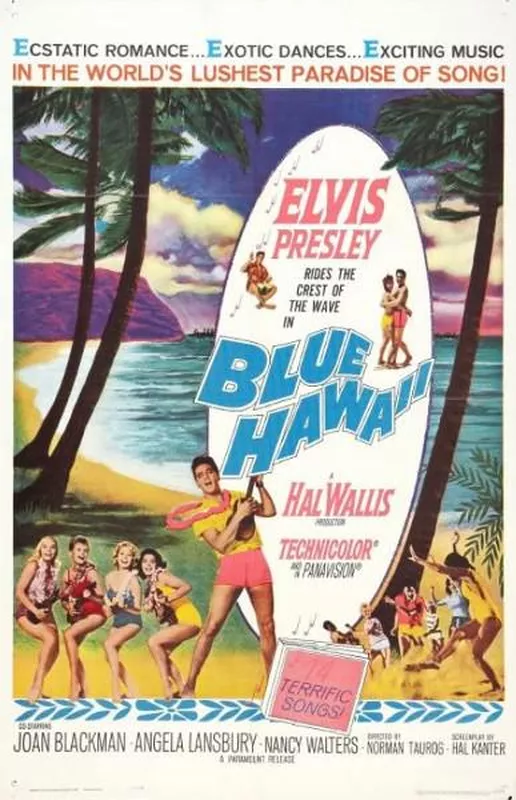
Paramount Pictures / IMDb
Release date: 1961
Director: Norman Taurog
IMDb score: 6.1/10
Box office earnings: $4.2 million
Blue Hawaii: The Bottom Line
Speaking of fun in the sun, “Blue Hawaii” marks the first time Elvis visits the Aloha State. Unfortunately, this flick had the same diminishing return as Presley’s later movies got, bogged down with the same unimaginative predictability that would doom his on-screen career.
For now, “Blue Hawaii” signals a time when an Elvis Presley movie could rake in dollars, and fans could expect to be treated to the singers crooning while actually dressed for the beach.
The plot is simple enough. Chadwick Gates, played by Elvis, is freshly discharged from the Army and wants nothing more than to surf and flirt all day. But his family wants him to take over their pineapple business and start adulting immediately.
Although critics weren’t thrilled with the feature, “Blue Hawaii” opened at No. 2 the week of its released and ended up as the 10th highest-grossing film of 1961. Yes, it was a success, but if you look closely at the plot, the styling and the bevy of beautiful women, you can already see the telltale signs of cookie-cutter film-making that would come to define Presley’s future movies.
12. Roustabout
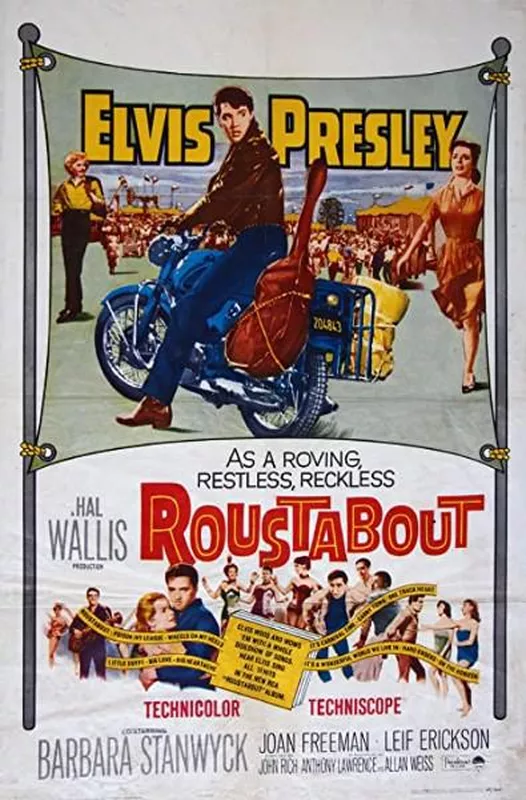
Paramount Pictures / IMDb
Release date: 1964
Director: John Rich
IMDb score: 6/10
Box office earnings: $7.2 million
Roustabout: The Bottom Line
“Roustabout” gets its name from the roustabout or carnie job that Presley’s character, Charlie Rogers, gets at a struggling circus that he ultimately saves with his musical talent. The film gave Elvis his most successful movie soundtrack, hitting No. 1 on the Billboard album chart. It also gifted us “biker” Elvis in a leather jacket, and we will take it.
Presley is very much into karate by this point, so in “Roustabout,” you get to see him showing off his martial arts moves. Having said that, there’s no way anyone is buying that the “college boys” he came up against were teens, let alone anywhere near their early 20s.
“Roustabout” is just formula-driven enough to be mediocre but still not the worst of the worst.
11. Tickle Me
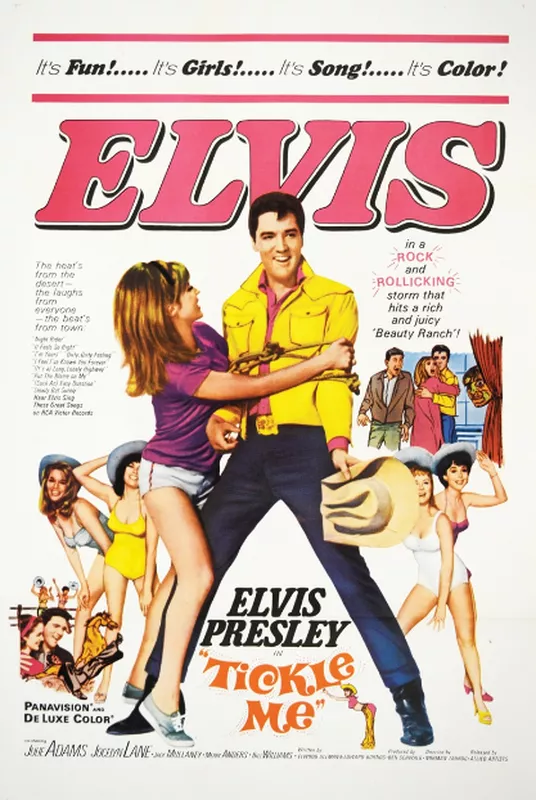
Allied Artists Pictures / IMDb
Release date: 1965
Director: Norman Taurog
IMDb score: 5.8/10
Box office earnings: $7.4 million
Tickle Me: The Bottom Line
Though widely panned by critics, “Tickle Me” was released at a time when Elvis still had a stellar box office pull. So much so that “Tickle Me” is credited with rescuing studio Allied Artists, which was in desperate financial straits at the time of filming. Not surprisingly, this ended up being the cheapest Elvis Presley movie ever made.
Despite winning the day in dollars, “Tickle Me” makes this list because it adheres to the uninspired, formulaic nature of most Elvis films: Elvis as a cowboy type who sings songs while surrounded by a bevy of beauties who must outwit the most cartoonish of villains this side of Looney Tunes.
No new tunes were created specifically for “Tickle Me,” which may or may not be a good thing depending on how you feel about the film.
10. Spinout
Release date: 1966
Director: Norman Taurog
IMDb score: 5.8/10
Box office earnings: $3 million
Spinout: The Bottom Line
In the movie “Spinout,” we get Elvis as a singing race car driver named Mike McCoy. By the time it hit theaters, we were settling into the humdrum film era of Elvis as a sleek caricature surrounded by women. One other pattern in Elvis Presley movies we would see play out with “Spinout” is the similar types of plots or characters rehashed over and over.
After “Viva Las Vegas” proved a runaway success, we got both “Spinout” and Speedway, which is also on this list. Neither of those movies was as good and would only serve as mediocre to cringeworthy contributors to the downward spiral that was Presley’s Hollywood career.
9. Frankie and Johnny
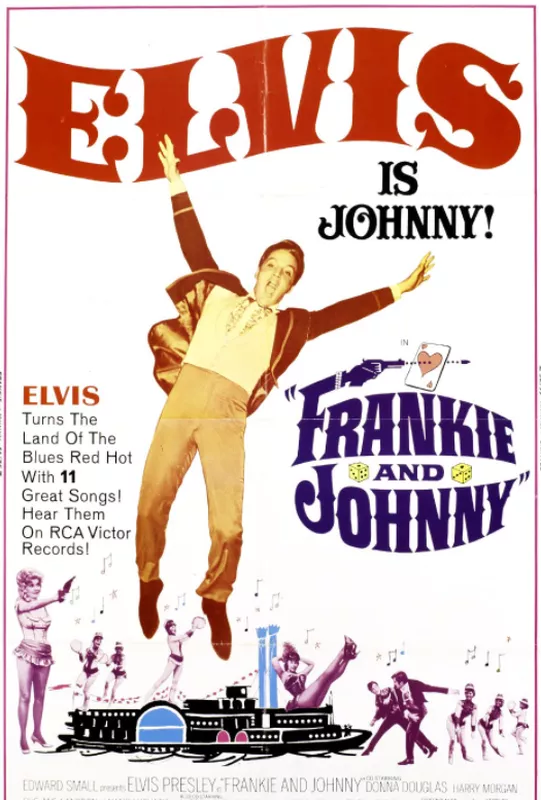
Edward Small Productions / IMDb
Release date: 1966
Director: Frederick De Cordova
IMDb score: 5.6/10
Box office earnings: $2.75 million
Frankie and Johnny: The Bottom Line
Elvis Presley plays Johnny opposite Donna Douglas’ Frankie. Though Douglas was better known as Ellie Mae of “The Beverly Hillbillies,” she works well in this role as Johnny’s long-suffering girlfriend. The characters take their name from the famous ditty about a woman who turns murderous when her boyfriend cheats. The characters eventually act out the song, but luckily, there’s no real bloodshed.
“Frankie and Johnny” isn’t that great of a film, and by this point, it was obvious Elvis Presley was going through the motions. Still, the climactic performance of the song for which the film is named is probably one of the best moments in any Elvis film, and everyone involved shines.
Sadly, things only get worse as this list goes on.
8. Speedway
Release date: 1968
Director: Norman Taurog
IMDb score: 5.5/10
Box office earnings: $4.36 million
Speedway: The Bottom Line
Elvis plays Steve Grayson, a racer forced to earn money fast to keep his manager out of jail. He ends up falling for pretty IRS agent Susan Jacks, which we would find highly unbelievable, even if she’s played by one Nancy Sinatra. There’s nothing sexy about getting almost locked up over taxes, but “Speedway” does try in that regard if for little else.
Speedway wraps up a trio of Elvis-as-a-racer films, and even if it wasn’t essentially a good movie, it does serve as part of the inspiration for the popular Japanese anime and manga character “Speed Racer.”
7. Paradise, Hawaiian Style
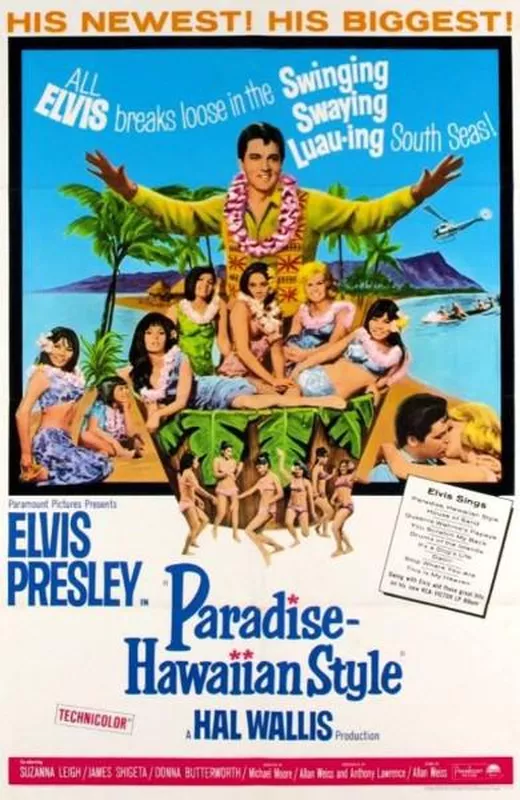
Paramount Pictures / IMDb
Release date: 1966
Director: Michael D. Moore
IMDb score: 5.4/10
Box office earnings: $2.5 million
Paradise, Hawaiian Style: The Bottom Line
And so we move to another cookie-cutter non-classic where Hollywood isn’t even trying to get Elvis to do anything more than bring up box office dollars. No variety or pizzazz necessary.
In this feature, Presley plays Rick Richards, a fired airline pilot who joins forces with a friend to start a helicopter charter business. The film itself is drab, and critics dubbed it utterly forgettable.
Off-set around this time, Elvis Presley met British singer Tom Jones, and the two would go on to be life-long friends. Jones wasn’t the only British musician Presley would meet with that year, as he famously connected with the Beatles.
6. The Trouble With Girls
Release date: 1969
Director: Peter Tewksbury
IMDb score: 5.3/10
Box office earnings: $252,500
The Trouble With Girls: The Bottom Line
Fully titled “The Trouble With Girls (and How to Get Into It),” this movie is bad. We don’t know if they were expecting us to root for Elvis Presley as Walter Hale in this movie, but it does not work.
Not only is Presley set up as a union-busting scumbag, who uses the local police to strong-arm his star into remaining with the troupe, but this disturbing characterization is also lost in the shuffle. As Margaret Harford of the Los Angeles Times succinctly puts it, “The trouble with the picture is not girls; it’s indecision by the writers.”
“The Trouble With Girls” doesn’t know if it wants to be a comedy, a drama or a musical. In past comedy-musicals, Elvis sang enough songs to justify an entire soundtrack; however, this time, he belts out only a few tunes.
5. Kissin’ Cousins
Release date: 1964
Director: Gene Nelson
IMDb score: 5.2/10
Box office earnings: $6.54 million
Kissin’ Cousins: The Bottom Line
There is a disturbing and sad aspect of “Kissin’ Cousins” if you know that Elvis is in fact the surviving member of a pair of twins. His identical twin brother, Jessie Garon, died at birth. If you want an idea as to what he would have looked like, you can literally see it in “Kissin Cousins,” as Elvis famously dyed his naturally blond hair.
As a film, “Kissin’ Cousins” is kind of fun, and though the title refers to Elvis in the double role of Second Lt. Josh Morgan and his hillbilly cousin Jodie Tatum, they do actually start singing about how they make out with their actual cousins, and it’s OK because they’re not that closely related. Keep in mind we are a long way off from “Game of Thrones” existing at this point.
4. Easy Come, Easy Go
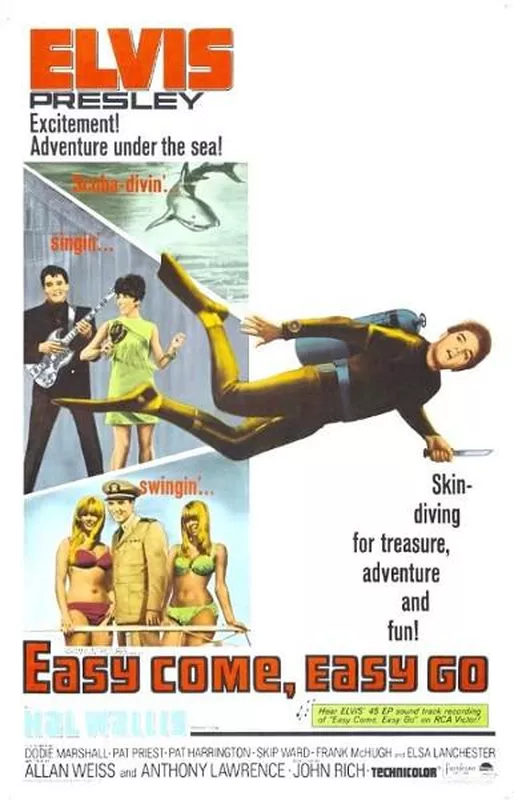
Paramount Pictures / IMDb
Release date: 1967
Director: John Rich
IMDb score: 5.2/10
Box office earnings: $4.25 million
Easy Come, Easy Go: The Bottom Line
The musical-comedy “Easy Come, Easy Go” shows how Hollywood just couldn’t fathom any Elvis Presley movie in which the character was not somehow a singer. In this movie, Presley portrays Ted Jackson, an ex-U.S. Navy frogman who is both a deep sea diver and a nightclub singer. Sure.
Even though we know Elvis looks good in a uniform, he did not need to have this random combination of jobs and interests in order for this character to work. Especially as, by this point, Presley isn’t even interested in trying in these roles.
“Easy Come, Easy Go,” bears the unfortunate distinction of featuring the worst-selling soundtrack of Elvis Presley’s movie career.
3. Double Trouble
Release date: 1967
Director: Norman Taurog
IMDb score: 5.1/10
Box office earnings: $3.49 million
Double Trouble: The Bottom Line
“Double Trouble” is a convoluted mess of a movie. Presley stars as Guy Lambert, who is being stalked by rich beautiful women (one of whom has a killer after her), while also tangling with bumbling thieves and Europe’s answer to the keystone cops. It’s a lot.
Interestingly, the starring role was originally written for a woman, specifically British actress Julie Christie. Critics felt that, while it was bad, it wasn’t as terrible as the previous movies. The fact that this is perhaps the highest compliment that could be paid to the film makes it all that much worse.
Notably, “Double Trouble” continued the Hollywood habit of paying Elvis Presley a king’s ransom for a subpar feature; he reportedly earned $750,000 and 40 percent of the profits.
2. Harum Scarum
Release date: 1965
Director: Gene Nelson
IMDb score: 4.6/10
Box office earnings: $6.76 million
Harum Scarum: The Bottom Line
Poor, Elvis. When he and his manager, Colonel Tom Parker, first saw the script for this role, they understood it to be a comedy. And it was, except it was written in a way that laughed at the King, not with him.
Then, there’s the highly problematic plot, which features Presley as American singer Johnny Tyrone who is hired to assassinate an Arab king but instead falls in love with his daughter. They marry, and he, she and some of her “dancing girls” honeymoon in Las Vegas.
Riddled with anti-Arab stereotypes and comedy that never lands in a film that’s absurdly cringeworthy, we kind of want to forget that “Harum Scarum” ever existed. Fortunately, it’s so bad that most of the world doesn’t even know it exists, so we guess that’s a silver lining?
1. Stay Away, Joe
Release date: 1968
Director: Peter Tewksbury
IMDb score: 4.5/10
Box office earnings: $1.5 million
Stay Away, Joe: The Bottom Line
Whoever was the driving force behind “Stay Away, Joe” clearly had not picked up a newspaper, turned on a news broadcast or looked at a calendar before pushing this tripe, which is blatantly offensive to Native Americans, into theaters.
Presley, who actually has blood ties to the Cherokee tribe, plays Joe Lightcloud, a Navajo who returns to the reservation to herd cattle using a white Cadillac convertible. And it only gets more ridiculous from there.
Timing is everything, and at a time when Native Americans had begun to protest their historically horrible treatment throughout the U.S., you have “Stay Away, Joe,” an unfunny comedy that demonstrates Hollywood’s long-term tone-deafness to the plight of marginalized people. Instead of telling Joe to stay away, we wish someone had told Elvis to stay away from this film.
How Elvis Bounced Back
By 1968, Elvis was viewed as a cookie-cutter caricature of his 1950s rocker self. This was in large part thanks to the predictable and inoffensive nature of his movies, which by this point had started to perform noticeably worse at the box office.
Not only was it clear that he wasn’t the draw that he’d been a decade earlier, but there was a real danger of him getting dethroned. But thanks to securing a comeback special on TV, Elvis was able to put his legacy — and that iconic black leather suit — in front of nearly 42 percent of American households.
Elvis did release a few more films following the special, but what mattered most was he was somewhat able to bounce back and remind the public about his status as a pop-culture icon and why he mattered as a music legend.